I Ching, Yijing or Zhou Yi
"Oracle of the moon": © 2000 LiSe
 Yi Jing, Oracle of the Moon
Yi Jing, Oracle of the Moon


Shaman and divination

Yì: change 易.
6 versions. The old pictures at left show the sun
with its rays emerging from behind a cloud or a moon with the sign for sacrifice. On OB often used to
indicate change of weather. The Yi-sacrifice is a sacrifice to the sun. Yi-ri
(change-day):
good fortune of the sun (appearing after absence, thanks to an ancestor or
spirit).
In Northern China weather was unpredictable: long
droughts, sudden torrents. Too much rain was life-threatening: the Yellow
River might cause a flood. More about Yi
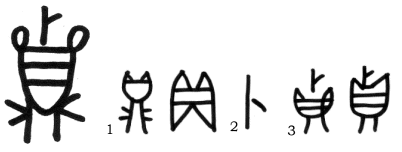 Zhen1: trial (ask oracle) 貞. Zhen is a ding, a sacrificial vessel (1) with the sign bu for ‘divination’: crack in scapula or tortoise-carapace (2). Oracle-consulting, but also receiving an answer. And the obligation to follow the advice of the gods: so it is also perseverance and correctness. Sometimes the Yi says “not permit determination”: don’t ask advice, find out every moment anew what this moment asks for.
Zhen1: trial (ask oracle) 貞. Zhen is a ding, a sacrificial vessel (1) with the sign bu for ‘divination’: crack in scapula or tortoise-carapace (2). Oracle-consulting, but also receiving an answer. And the obligation to follow the advice of the gods: so it is also perseverance and correctness. Sometimes the Yi says “not permit determination”: don’t ask advice, find out every moment anew what this moment asks for.
 Bu3, fortune telling 卜
Bu3, fortune telling 卜Foretell, predict, select, choose, divination. To make the cracks (for pyromancy). Diviner, charged with making or reading the cracks. The ideogram is a picture of a crack. Bu-gua: divine by eight trigrams or 64 hexagrams.
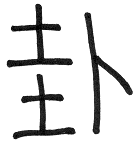

Guà biàn, transformation 掛變 of one hexagram into another.
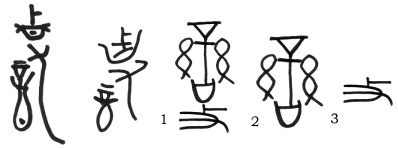 Biàn, change 變 (4 versions), bells on horses trappings (2), with a hand with stick: to beat (3). Meanings: change of a musical note: half tone lower. Change, modify, vary, change of conduct, to reform oneself, change one’s place. Transform. In hex.49, lines 5 and 6.
Biàn, change 變 (4 versions), bells on horses trappings (2), with a hand with stick: to beat (3). Meanings: change of a musical note: half tone lower. Change, modify, vary, change of conduct, to reform oneself, change one’s place. Transform. In hex.49, lines 5 and 6.
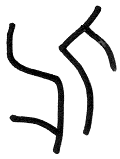 Huà, change 化, transform, reform, evolution, change morals; convert, melt; dissolve; thaw, digest; remove, burn up; incinerate, disguise, die; pass away, culture, chemistry. (Character not in the YiJing)
Huà, change 化, transform, reform, evolution, change morals; convert, melt; dissolve; thaw, digest; remove, burn up; incinerate, disguise, die; pass away, culture, chemistry. (Character not in the YiJing)

 Biàn huà, change 變化, transformation, variation, mutation. (Character not in the YiJing)
Biàn huà, change 變化, transformation, variation, mutation. (Character not in the YiJing)

 Biàn guà, change 變掛 of horoscope, sudden change of opinion, break one's promise, retract one's word, sudden change of a situation.
Biàn guà, change 變掛 of horoscope, sudden change of opinion, break one's promise, retract one's word, sudden change of a situation.
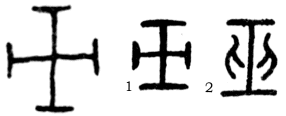 Wu1, shaman/medium 巫 . Wang Hong Yuan: derives from the character for nr. 5, Leyi: bamboo strips laid in cross which was the prop for the diviner. Magus, mage, shaman, witch, wizard, female shaman or shamaness (should be shamanka); the four Wu1 spirits, to whom sacrifices were made. Corresponding to the four great territories Fang, assistants of the great ancestor Di. (Ancestress Di, see Di!). Northern -, Eastern Wu, etc. To perform the ritual dance Wu. Wu Di: to perform the sacrifice Di for the (four) Wu spirits. Shuo Wen: a dancing sorceress with long sleeves. Two other versions: 1 and 2.
Wu1, shaman/medium 巫 . Wang Hong Yuan: derives from the character for nr. 5, Leyi: bamboo strips laid in cross which was the prop for the diviner. Magus, mage, shaman, witch, wizard, female shaman or shamaness (should be shamanka); the four Wu1 spirits, to whom sacrifices were made. Corresponding to the four great territories Fang, assistants of the great ancestor Di. (Ancestress Di, see Di!). Northern -, Eastern Wu, etc. To perform the ritual dance Wu. Wu Di: to perform the sacrifice Di for the (four) Wu spirits. Shuo Wen: a dancing sorceress with long sleeves. Two other versions: 1 and 2.
 Bu3 shì, divining 卜筮 (in DaZhuan).
Shi: yarrow divination. Bamboo-shaman: in the modern character bamboo is added (bamboo or ‘plants which grow in winter, like bamboo’), indicating he is the chronicler, who writes on the bamboo strips, or maybe it indicates the sticks he uses for divination. This is the ancient character, later the next 'shi' was used.
Bu3 shì, divining 卜筮 (in DaZhuan).
Shi: yarrow divination. Bamboo-shaman: in the modern character bamboo is added (bamboo or ‘plants which grow in winter, like bamboo’), indicating he is the chronicler, who writes on the bamboo strips, or maybe it indicates the sticks he uses for divination. This is the ancient character, later the next 'shi' was used.
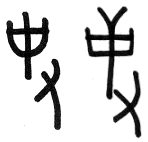 Shi4, chronicle(r) 事, official in charge of chronicles, historian, assistant, affairs, to charge. Two different characters, with almost the same original character. The left one is Ricci 9721, the right one R.9711. A hand with a bow drill (to mark the oracle bones to seek the divine guidance) indicates the official. The chronicle officials were responsible for divination.
The Di shi feng (Di - chroniclers - wind) were the Phenix assistants of Di, in charge of the winds.
Shi4, chronicle(r) 事, official in charge of chronicles, historian, assistant, affairs, to charge. Two different characters, with almost the same original character. The left one is Ricci 9721, the right one R.9711. A hand with a bow drill (to mark the oracle bones to seek the divine guidance) indicates the official. The chronicle officials were responsible for divination.
The Di shi feng (Di - chroniclers - wind) were the Phenix assistants of Di, in charge of the winds.
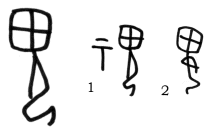 Gui, ghost 鬼3, bad fortune, calamity, name of a tribe at the North-East of the Shang.
Ideogram: person with demon's head. 1: with ‘altar’: 'show' or 'omen', 2: a female one.
Gui, ghost 鬼3, bad fortune, calamity, name of a tribe at the North-East of the Shang.
Ideogram: person with demon's head. 1: with ‘altar’: 'show' or 'omen', 2: a female one.
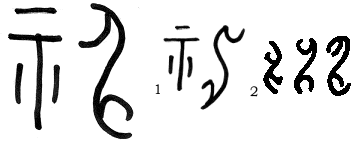 Shén, spirit 神, god, deity, divinity, soul, mind, vitality; energy, supernatural, magical, smart, clever.
Composed of altar (show or omen, 1) and a drawing of a lightning bolt (2).
Shén, spirit 神, god, deity, divinity, soul, mind, vitality; energy, supernatural, magical, smart, clever.
Composed of altar (show or omen, 1) and a drawing of a lightning bolt (2).
 Tu3, earth 地. The left part is tu3, a clog of earth (1: three other forms). The right part is ye3, a water jug for oblations or for adding water to the wine: 2. Modern meaning : also, even, more or less. The oldest form of this character is ta, snake or female sex organ: last character at right. Tu3 is the name of hexagram 2.
Tu3, earth 地. The left part is tu3, a clog of earth (1: three other forms). The right part is ye3, a water jug for oblations or for adding water to the wine: 2. Modern meaning : also, even, more or less. The oldest form of this character is ta, snake or female sex organ: last character at right. Tu3 is the name of hexagram 2.
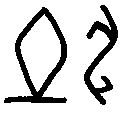 Kun1, earth 坤. The left part is tu3, a clog of earth, the right part is shén, lightning, spirit; stretch or expand. See next character. Kun is the name (tag) of hexagram 2. For its meaning see Kun-story. The expanse of earth: the huge field of energy we live in.
Kun1, earth 坤. The left part is tu3, a clog of earth, the right part is shén, lightning, spirit; stretch or expand. See next character. Kun is the name (tag) of hexagram 2. For its meaning see Kun-story. The expanse of earth: the huge field of energy we live in.

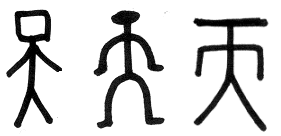 Tian1, heaven 天. The one at right says most clearly what is meant: above the head. But all three might be pictures of "the Godhead". All are oracle bone characters. Meanings: overhead, sky, heaven, god, day, weather.
Tian1, heaven 天. The one at right says most clearly what is meant: above the head. But all three might be pictures of "the Godhead". All are oracle bone characters. Meanings: overhead, sky, heaven, god, day, weather. Di4, earth, soil 土3 (4 versions), soil; clay, land, opium, local, native, indigenous, uncouth, crude. This is part of the character for hexagram 2
Di4, earth, soil 土3 (4 versions), soil; clay, land, opium, local, native, indigenous, uncouth, crude. This is part of the character for hexagram 2